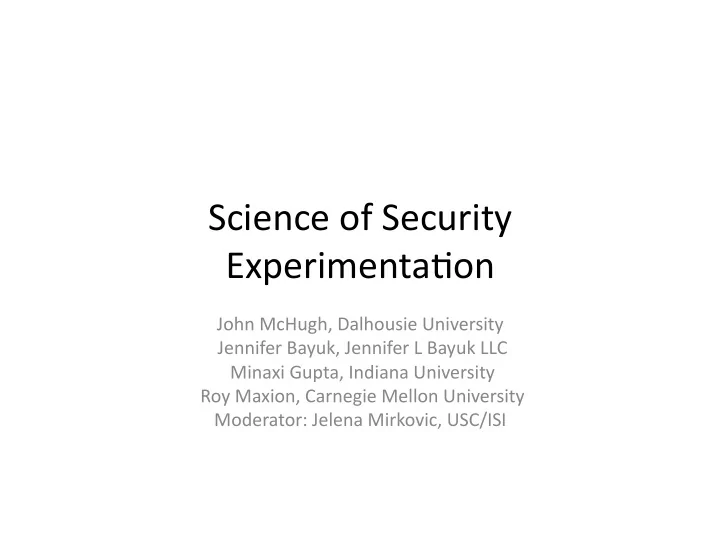

Science of Security Experimenta2on John McHugh, Dalhousie University Jennifer Bayuk, Jennifer L Bayuk LLC Minaxi Gupta, Indiana University Roy Maxion, Carnegie Mellon University Moderator: Jelena Mirkovic, USC/ISI
Topics • Meaning of science • Challenges to rigorous security experimenta2on: – Approach? choice of an appropriate evalua2on approach from theory, simula2on, emula2on, trace‐based analysis, and deployment – Data? how/where to gather appropriate and realis2c data to reproduce relevant security threats – Fidelity? how to faithfully reproduce data in an experimental seOng – Community? how to promote reuse and sharing, and discourage reinven2on in the community • Benchmarks? Requirements for and obstacles to crea2on of widely accepted benchmarks for popular security areas • Scale? When scale maRers?
Top Problems • Good problem defini2on and hypothesis – Lack of methodology/hypothesis in publica2ons – Learn how to use the word “hypothesis” • Lack of data – Data is moving target, hard to affix science to aRacks that change • Program commiRees – Hard to publish, hard to fund, no incen2ve to good science – Data needs to be released with publica2ons • Who really cares except us? • Rigor applied to defenses not to aRacks – Define security • Do we want science or engineering? • Years behind aRackers • Provenance, tools that automate collec2on of provenance
Closing statements • Learn from publica2ons in other fields • What you did, why was it the best thing to do (methodology and hypothesis maRer) • Right now we have the opportunity to change – Learn from other fields before we grow too big too wide too fast – We must avoid adop2ng wrong but easy approaches, hard to change • Data is crucial, we need to focus on geOng more data on ongoing basis – One‐off datasets don’t cut it
Approach • Use what you think will give you the best answer for the ques2on you have – Understanding your op2ons and your hypothesis is what maRers, the rest is given – Also constraints on 2me and resources • Write up all the details in the methods sec2on – Forcing people to write this all down would lead to many paper rejec2ons and would quickly teach people about the rigor – Experience with QoP shows it’s hard to even have people write this down, let alone do it correctly
Data • Who has the data? • How to get access? • Lengthy lawyer interac2ons. In the mean2me research isn’t novel anymore. • Resources to store data • Results cannot be reproduced when data is not public • No long‐term data sets (10 years, study evolu2on) in real 2me – Need good compute power where the data is – There are common themes in data analysis – this could be precomputed • www.predict.org (lots of data here) • Hard to get data on aRacks before persecu2on is done, may be years. Also companies don’t want to admit to be vic2ms.
Data • Metadata necessary for usefulness (anonymiza2on, limita2ons, collec2on process) – Not enough info to gauge if data is useful to researchers – No detail about sanity checks, calibra2on steps – Improve collec2on design AND disclose it • Understanding of common data products would drive beRer collec2on rigor • Not every ques2on can be answered with a given data – rela2onship of data to problems is important • Provenance on data, what can be done with it • Keystroke data with proper metadata (by Roy Maxion) – hRp://www.cs.cmu.edu/~keystroke
Community • We’re compe2ng among each other, aRackers are advancing • Adop2on of protocols is field for research • Problems that lack datasets are just not being addressed • Teaching builds beRer experimental prac2ces – Requirement courses for degrees • Rigor requirements in conflict with funding – Actually in conflict with publishing and research community
Meaning of Science • Tightly focused ques2on – Forming a research hypothesis • Then validity, reproducibility by someone else, repeatability ‐ are important • Repeatability – same run similar answers • Validity – External validity ‐ can you generalize your claims to a different, larger, popula2on – Internal validity – logical consistency internally in the experiment • There’s no building on work of others so rigor is not necessary – We don’t even have the right ques2ons formed • NSF workshop on science of security, Dec’08 in Claremont
Where to Start? • Formula2ng good ques2ons – Predictability is a hard problem in security – Well‐defined, small, constrained problems make sense • Take courses on experimental design/ methodology (students) • Read papers and cri2que the methodology in them • Finding right tools to produce answers
Where to Start? • Security means different things to different people – Must define which aRribute of security you’re measuring • What PC’s could do: – Enforce methodology/hypothesis ques2ons – Enforce reproducibility • Extra work with no quick payoff for select few that do what we suggest • ARackers can avoid well‐defined models – We need stronger models then
Where to Start? • ARackers are evolving – moving target – Hard to match this pace with methodology evolu2on – Major logic is missing • Large number of things manifest as security problems but are not – Buffer overflows are coding problems, sloppy sw
What to Fund • Educa2on • A cri2cal review journal • Requirements analysis – ARributes of systems that give you assurance that your goals are met – Close specifica2on of context
Recommend
More recommend